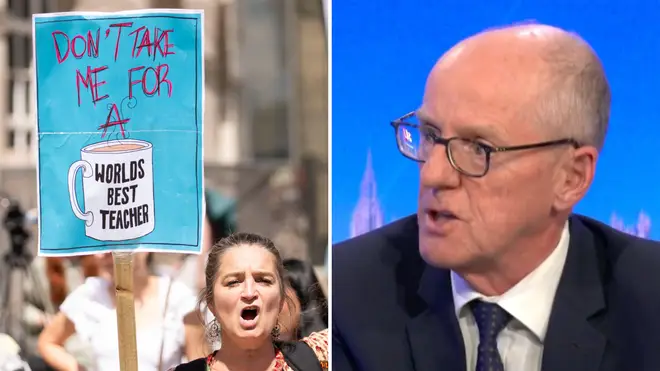
Clive Bull 1am - 4am
13 July 2023, 18:50

The schools minister has refused several times to reveal how nearly half of the pay rise for teachers revealed on Thursday by Rishi Sunak will be funded.
The Prime Minister announced a 6.5% pay increase for teachers today, accepting recommendations from the government’s independent review body.
Some 3.5% of that pay rise will come from existing school budgets, which the government topped up with £525 million of extra money in 2023-24 and a further £900 million in 2024-25. That's after a school budget increase of £3.5 billion next year.
The remaining 3% is to come from government budgets, and Mr Sunak said he would not cut taxes or borrow more to raise this money. More than £1billion will come form “significantly” raising fees on visa applications and access to the NHS for migrants.
A big chunk of the remaining funds will be found through "reprioritisation", which is understood to refer to cuts from department budgets or trying to underspend.
Speaking to schools minister Nick Gibb on Thursday evening, LBC's Andrew Marr sought to pin down what exactly would be cut to fund the 3% uplift for teachers' salaries.

Andrew Marr quizzes School's Minister on the public sector pay rise.
Mr Gibb said the cuts would "not impact on schools at all", adding that "central budgets... are being reprioritised". On top of this, money will also come from budget underspend that would normally go back to the Treasury, he said.
Asked several times for more details, the schools minister would only say what would not be cut - school budgets.
He told Andrew: "It will not impact on their capital budgets - we need to make sure schools are properly maintained… it will not affect special needs budgets, it won’t affect childcare - it won’t affect any of the revenue streams going into schools."
Mr Gibb also told Andrew that teaching assistant budgets and teaching of particular subjects would also not be affected, because this is a budget decision for individual schools.
The minister said that officials were still working on the details and "are making some very difficult decisions about central programmes" that will have to be cut. He would not elaborate on what these central programmes were.

Dr Mary Bousted, the joint general secretary of the largest teaching union, the National Education Union (NEU), said on Thursday that the pay offer was the “biggest [pay rise] teachers have received since 2000.”
She attributed the victory to unions’ ongoing strike action, while adding that the offer was “properly funded”.
Dr Bousted added: “Importantly, the Government's offer is properly funded for schools. The Government has committed that all schools will receive additional funding above what was proposed in March, building on the additional £2 billion given to schools in the Autumn Statement.
"The Government will also provide a hardship fund of up to £40 million to support those schools facing the greatest financial challenges.”
The pay recommendations will “allow teachers and school leaders to call off strike action and resume normal relations with government,” she said in the joint statement with the government.
The Prime Minister said the decision had been a difficult one, as it would “cost all of you as taxpayers more than we had budgeted for”.
“That’s why the decision has been difficult, and why it has taken time to decide the right course of action. I can confirm today that we are accepting the headline recommendations of the pay review bodies in full, but we will not fund them by borrowing more or increasing your taxes,” he said.
Earlier, Chancellor Jeremy Hunt said the Government would take "difficult but responsible" decisions on public sector pay.
He told MPs that "it is important to deliver on the Prime Minister's priority to get debt falling and to control borrowing to avoid adding inflationary pressures and risk prolonging higher inflation".
"That means taking difficult but responsible decisions on the public finances, including public sector pay, because more borrowing is itself inflationary," Mr Hunt said.
Police, NHS staff, junior doctors, prison officer and armed forces are also to benefit from the recent pay offer, which will vary between five and 7%.
Rishi Sunak said: “Today’s offer is final, there will be no more talks on pay. No amount of strikes will change this decision.”
The Government's has ruled extra borrowing to fund the pay increases, which could leave departments forced to find £3 billion from existing budgets.
ASCL, NAHT, NASUWT and NEU are now expected to put forward the deal to members with a recommendation to accept so teachers and school leaders are able to call of the strikes.